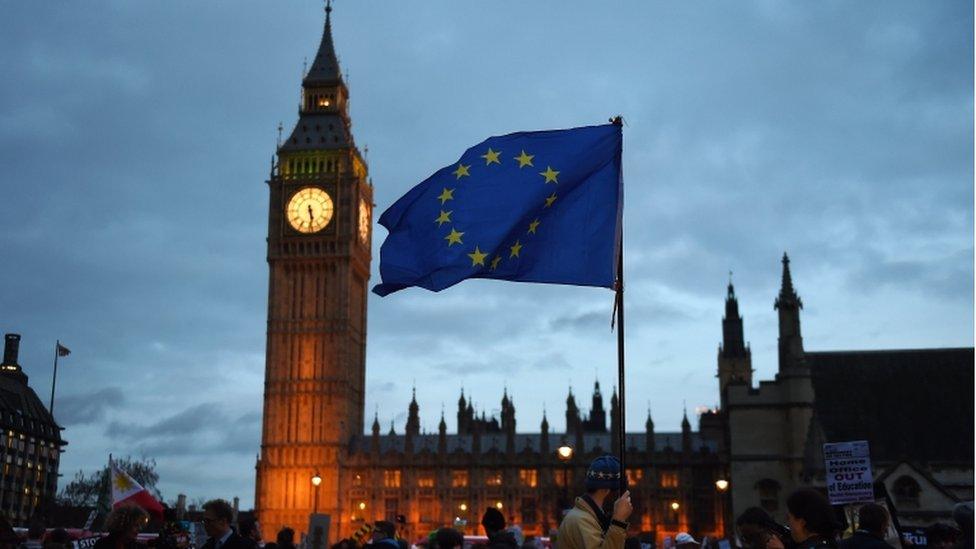Brexit: What would 'no deal' look like?
- Published
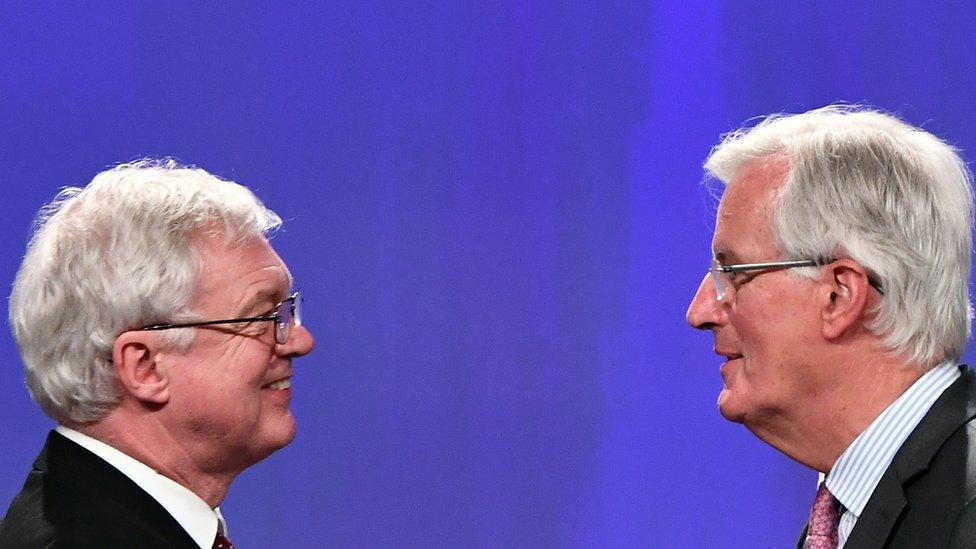
UK Brexit Secretary David Davis and Chief EU Negotiator Michel Barnier say they both want a deal
There's a lot of discussion at the moment about a 'no deal' Brexit. What does that actually mean?
It seems to mean slightly different things to different people. But in the current context it basically means that there would be no formal agreement reached during the negotiations between the UK and the EU, which are taking place under the terms of Article 50 of the Lisbon Treaty.
These are the negotiations that are led by David Davis for the UK and Michel Barnier for the EU - the fifth round of talks is being held in Brussels this week.
Even if there is no deal under Article 50, there would still have to be some kind of formal relationship between the UK and the EU in the long term - for trade, security and every other aspect of bilateral ties. But if the Article 50 process fails there is very little time to work on alternative strategies before Brexit in March 2019.

When would we know if there was going to be a 'no deal' Brexit?
This is an important question because the timing is critical.
One scenario, being pushed by some Eurosceptic Conservative MPs, is that if the current negotiations make no progress - and the EU refuses to move on to talk about a future trade deal - the UK should announce that it will pursue a 'no deal' Brexit instead. Leave supporters believe that would free the UK from all EU structures in one fell swoop.
If such a decision were to be made in, say, March 2018 there would still be a year before the UK is due to leave the EU. That's very little time to prepare for such a massive change, but it would be better than nothing.
A more worrying scenario for many business leaders, and millions of citizens who are caught up in the Brexit process, is that something could go wrong at the very last minute - perhaps a deal that has been tentatively agreed but is subsequently rejected by one side or the other.
Then the UK could crash out of the EU with neither side fully prepared for the consequences. This is the 'cliff edge' that gives many people in business and politics sleepless nights - a chaotic Brexit that would benefit no one.

Are preparations for 'no deal' already taking place?
Yes they are - on both sides of the Channel.
The UK government has been careful to say that it is not seeking a 'no deal' outcome, but that it has to be prepared for all eventualities.
The Prime Minister has tried to move away from an emphasis on her initial message that "no deal is better than a bad deal" - but when pushed she continues to defend that stance.
So there is a combination here of prudent planning behind the scenes, and public statements which aim to have an impact on the negotiations - trying to hurry things up by warning of possible alternatives.
For the EU, the President of the European Council Donald Tusk has been very clear, arguing that no deal would be the worst deal of all.
"A no-deal scenario would be bad for everyone," he said earlier this year, "but above all for the UK."
Contingency planning is also happening elsewhere in the EU, though - within both governments and the business community.
The Federation of German Industries (BDI) said last week that it was setting up a task force of major companies to make provisions for the "serious case of a very hard exit." Anything else, it said, would be naïve.

What would 'no deal' mean in practice?
If the two-year Article 50 process came to an end with no agreement, the UK would leave the EU on 29 March 2019 with no deal in place.
Again, much would then depend on how long both sides have had to prepare for this.
The consequences of 'no deal' would affect almost every aspect of life, and it is impossible to say exactly how events would unfold. But here are a few examples:
Money: With no agreement in place, according to a House of Lords report, external there would be no legal obligation for the UK to make any payment as part of a financial settlement.
That would leave a huge hole in the EU budget. It would save the UK money in this instance, but it would antagonise the rest of the EU and further sour relations. Legal action, possibly via the International Court of Justice in The Hague, could not be ruled out.
Citizens: Without a deal or other residency rights, the entitlement of EU nationals to reside in the UK, or of UK nationals to reside elsewhere in the EU, could technically disappear overnight.
In theory, they could become third country nationals, subject to domestic immigration rules. Given the fact that this would affect more than three million EU citizens in the UK, and nearly a million UK citizens in the EU, it could well be that individual EU countries would try to strike deals with the UK to guarantee citizens' rights. Common sense should prevail, but that cannot be guaranteed.
Trade: With no new trade agreement with the EU, the rules of the World Trade Organisation would apply. Tariffs would be imposed on goods that the UK sends to the EU, and on goods the EU sends to the UK.
It would not be the frictionless trade - certainly to begin with - that the government hopes to promote. Tariffs on many industrial products would be 2-3%, but on cars they would be 10% and on many agricultural products between 20% and 40%.
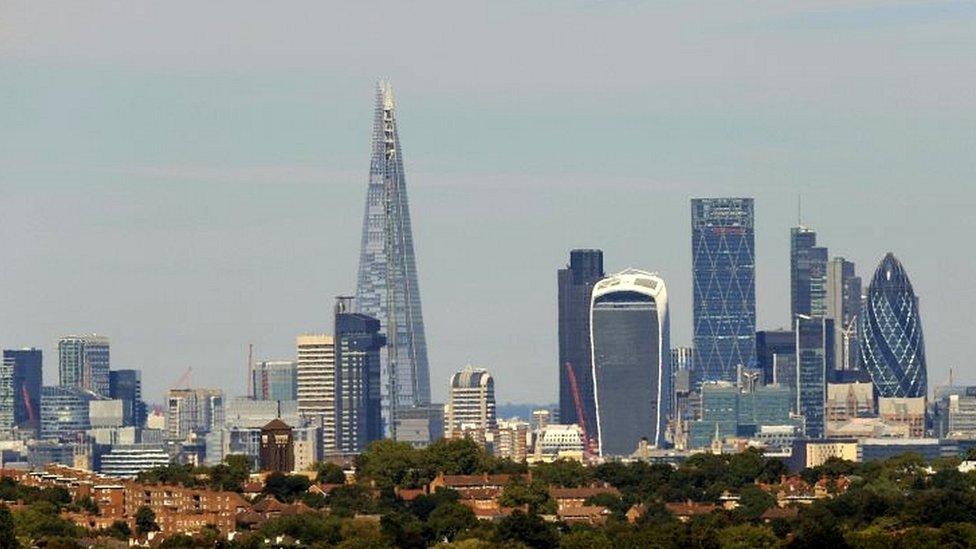
The trade in services would also suffer if nothing was agreed in advance. Under a pure 'no deal' scenario, businesses would lose their passporting rights, which allow them to sell their services across the EU without having to obtain licences in each individual country.
The financial services industry would be particularly vulnerable, and it accounts for a significant slice of the UK economy. Again it is worth emphasising that all these restrictions would apply to EU businesses wanting to trade in the UK as well. 'No deal' is not a one-way street.
Without any deal, and with no transition period negotiated, the UK would be free to sign trade agreements around the world as soon as it could finalise them. How might it try to go about this? There are a few pointers here.
Customs: A government White Paper on customs, published yesterday, sets out options for a 'no deal' scenario in more detail.
A customs bill will make provision for the UK to establish a stand-alone customs regime from day one, applying the same duties to every country with which it has no special deal.
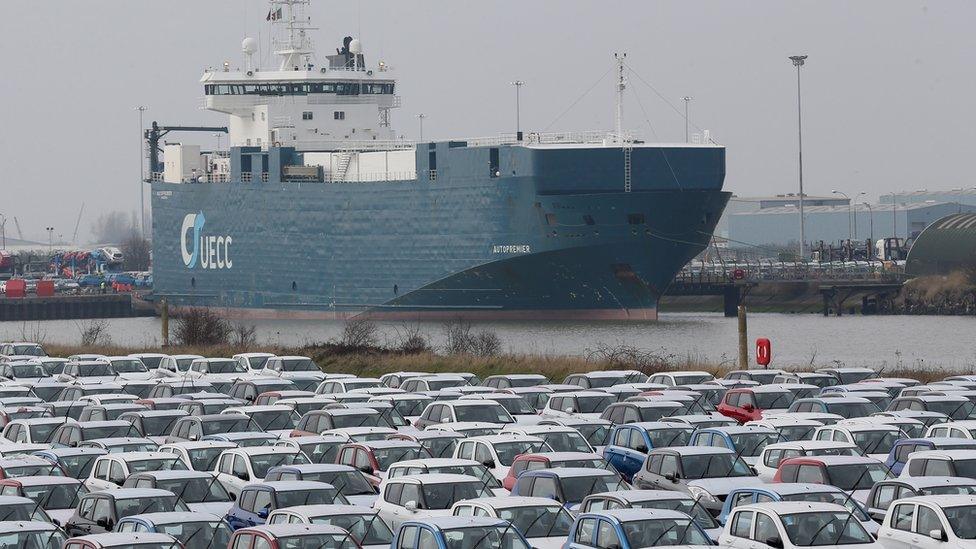
Traders would need to present goods to HM Revenue and Customs "inland as much as possible" to avoid congestion at ports, and consignments would need to be pre-notified to customs authorities, to try to ensure that trade continues to flow as seamlessly as possible.
The White Paper promises to minimise disruption for business and travellers - but to give some idea of the scale of the challenge, HMRC estimates that about 130,000 businesses that export to the EU would be dealing with customs for the first time.
'No deal' is not the government's preferred option; and the detail in the customs paper hints at how disruptive it could be. The border between Northern Ireland and the Republic of Ireland would, in particular, be a huge concern, with serious ramifications for the Northern Ireland peace process.
Regulations: With no deal of any kind in place, the UK would suddenly cease to be a member of dozens of regulatory agencies that govern many aspects of daily life.
In time, it would need to replace all of them with agencies of its own. Thousands of new employees would need to be recruited and trained - a process which should have already started if there were to be any chance of it being completed before Brexit.
EU bodies that regulate the aviation industry and the pharmaceutical industry are often cited as prime examples. One of the main concerns associated with a 'cliff edge' Brexit is that there would be no time to put new measures in place, even if plenty of contingency planning had been done.
In theory - under a worst case scenario - that could mean that planes would be grounded temporarily, and drugs could not be imported.
But again, the hope would be that common sense would prevail, and that some kind of interim arrangements would be made to keep things moving.
It would be in the interests of neither the UK nor the EU for chaos to ensue.



- Published21 March 2017
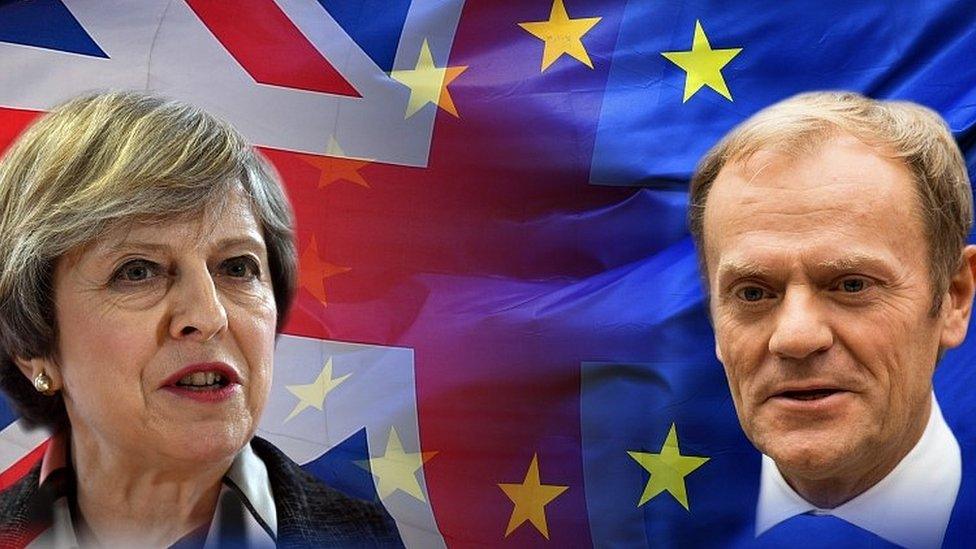
- Published30 December 2020

- Published29 March 2017
